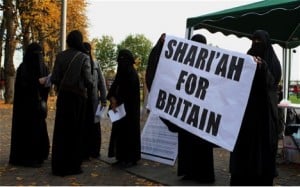This post was written by guest contributor Shereen Malherbe (@malherbegirl).
Headline grabbing assertions made by British MP Baroness Cox regarding Muslim men having up to 20 children each have been condemned by the Muslim community. In search of the representation of women in the UK media, it didn’t take me long to come across the Telegraph article where the “20 children” claim appears among a number of other statements about egregious violations of women’s rights by Muslim men under Sharia law. Baroness Cox made the remarks in putting forward “proposals to close a loophole in the Equality Act which she said enables Sharia courts to practice sexual discrimination.” In the article, she positions herself as being a voice for Muslim women, however I would argue that her statements contribute to a negative image of the Muslim women she purports to protect.
Cox makes generalisations from what appear to be unquantified sources as she states, “My Muslim friends tell me that in some communities…”This in itself, is highly problematic and unrepresentative. Furthermore, her statement, ‘in some communities…’ is vague. Which communities is she talking about? And if it is specific communities why is the headline about all Muslims? Community and culture-based religious differences contribute to different interpretations which not the norm for all Muslims the world over, and for some, not even necessarily permissible in Islam. Grouping Muslims under the same banner does nothing except promote a single, incorrect, stereotypical image.

In addition, the article is accompanied by an image of veiled women holding a ‘Sharia Law’ sign, despite the article’s intention being about women’s supposed discrimination in Sharia Law. Contradictory? Confusing? It appears so. Not to mention the headline is about men. Why then has The Telegraph chosen to use a picture of women and not an image of Muslim men which the headline is about? Is it just because veiled Muslim women have become more identifiable with Islam because of their clothing choices?
The article cites several other peers including Baroness Donaghy, who states, ‘it was not that long ago that women were unequal before the law’and that Britain cannot allow women’s rights to slide backwards. I agree with her that, “We must not tolerate the sweeping of violence against women or children under the carpet by any religion in the name of faith.” However, making sweeping claims about the violations of women’s rights does not help.
It also does not help to have this piece on the abuses of Sharia courts alongside a list detailing David Cameron’s plans to tackle extremism, a juxtaposition that brings a whole host of complex and not always related issues under a broad umbrella of extremism. This article, despite its short length combines Sharia law, voiceless Muslim women, multiple children from polygamous marriages and extremism linked to Muslim dysfunctional families. That is a lot to tackle in such a short piece and it results in extremely simplisitc coverage.
I am arguing not for less investigation of abuses of Muslim women’s rights, but rather for more: more detail, more specificity about how and why and where and more involvement of those directly affected. That people who write such articles do not attempt to seek out Muslim women’s voices for added depth to the discussion on Muslim women as victims is irresponsible and contributes to a negative public opinion of an already misunderstood religious group.
Now needs to be the time when media outlets are called to account for negative, misrepresentative stereotypes that are impacting on the increasing abuse of a group in society, a group Baroness Cox says she is trying to protect. Muslim women are becoming easy targets for attacks by those who have a distorted viewpoint of Islam in part because of biased, unrepresentative media articles written by those who have little contact, experience or knowledge of life in Muslim communities. This article, unfortunately is no exception.













